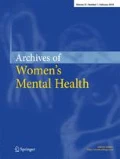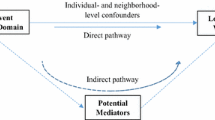Abstract
The effects of financial strain during pregnancy have received limited attention. In addition, data examining the pathways by which SES indicators contribute to birth weight are lacking. The objective of the current study was to examine the potential pathway of psychological distress in the relationship between financial strain and birth weight. Participants consisted of 138 pregnant women who completed measures assessing financial strain, depressive symptoms, pregnancy-specific distress, perceived stress, and general anxiety during pregnancy (mean gestational age = 18.5, SD = 7.2). Birth outcome data were obtained via medical record review. Simple and parallel mediation models were conducted using PROCESS. Simple mediation models showed that depressive symptoms (95% CI −24.65, −0.90) and pregnancy-specific distress (95% CI −37.31, −5.91), but not perceived stress (95% CI −31.17, 4.69) or anxiety (95% CI −25.84, 5.57), served as mediators in the relationship between financial strain and birth weight. When depressive symptoms and pregnancy-specific distress were included in the same mediation model, only pregnancy-specific distress remained significant. Financial strain was positively associated with all facets of psychological distress and negatively associated with birth weight during pregnancy. The current study demonstrated the mechanistic role of pregnancy-specific distress in the link between financial strain and birth weight in a racially diverse sample. Interventions targeting pregnancy-specific distress may mitigate the effects of financial strain on birth weight. Studies examining whether pregnancy-specific distress accounts for the relationship between other types of stressor exposures and birth weight would be informative.
Similar content being viewed by others
References
Alderdice F, Lynn F, Lobel M (2012) A review and psychometric evaluation of pregnancy-specific stress measures. J Psych Obstet Gynecol 33:62–77
Beddoe AE, Lee KA (2008) Mind‐body interventions during pregnancy. J Obstet Gynecol Neo Nurs 37:165–175
Blair L, Porter K, Leblebicioglu B, Christian L (2015) Poor sleep quality and associated inflammation predict preterm birth: heightened risk among African Americans. Sleep 38:1259–1267
Blumenshine P, Egerter S, Barclay CJ, Cubbin C, Braveman PA (2010) Socioeconomic disparities in adverse birth outcomes: a systematic review. Am J Prev Med 39:263–272
Breslau N, Chilcoat H, DelDotto J, Andreski P, Brown G (1996) Low birth weight and neurocognitive status at six years of age. Biol Psychiatry 40:389–397
Christian LM, Franco A, Glaser R, Iams JD (2009) Depressive symptoms are associated with elevated serum proinflammatory cytokines among pregnant women. Brain Behav Immun 23:750–754. doi:10.1016/j.bbi.2009.02.012
Christian LM, Franco A, Iams JD, Sheridan J, Glaser R (2010) Depressive symptoms predict exaggerated inflammatory responses to an in vivo immune challenge among pregnant women. Brain Behav Immun 24:49–53. doi:10.1016/j.bbi.2009.05.055
Cohen S, Kamarck T, Mermelstein R (1983) A global measure of perceived stress. J Health Soc Behav 385–396
Conger RD, Ge X, Elder GH, Lorenz FO, Simons RL (1994) Economic stress, coercive family process, and developmental problems of adolescents. Child Dev 65:541–561
Coussons-Read ME et al (2012) The occurrence of preterm delivery is linked to pregnancy-specific distress and elevated inflammatory markers across gestation. Brain Behav Immun 26:650–659
Dailey DE, Humphreys JC (2011) Social stressors associated with antepartum depressive symptoms in low‐income African American women. Public Health Nurs 28:203–212
Dunkel Schetter C, Lobel M (2010) Pregnancy and birth: a multilevel analysis of stress and birth weight. In: Revenson TA, Baum A, Singer J (eds) Handbook of health psychology. Psychology Press, New York, pp 431–464
Dunkel Schetter C, Tanner L (2012) Anxiety, depression and stress in pregnancy: implications for mothers, children, research, and practice. Curr Opin Psychiatry 25:141
Friedman EM, Herd P (2010) Income, education, and inflammation: differential associations in a national probability sample (the MIDUS study). Psychosom Med 72:290
Georgiades A, Janszky I, Blom M, László KD, Ahnve S (2009) Financial strain predicts recurrent events among women with coronary artery disease. Int J Cardiol 135:175–183
Gissler M, Meriläinen J, Vuori E, Hemminki E (2003) Register based monitoring shows decreasing socioeconomic differences in Finnish perinatal health. J Epidemiol Community Health 57:433–439
Grote NK, Bledsoe SE (2007) Predicting postpartum depressive symptoms in new mothers: the role of optimism and stress frequency during pregnancy. Health Soc Work 32:107–118
Gruenewald TL, Cohen S, Matthews KA, Tracy R, Seeman TE (2009) Association of socioeconomic status with inflammation markers in black and white men and women in the coronary artery risk development in young adults (CARDIA) study. Soc Sci Med 69:451–459
Hamilton BE, Hoyert DL, Martin JA, Strobino DM, Guyer B (2013) Annual summary of vital statistics: 2010–2011. Pediatrics 548–558
Hayes AF (2013) Introduction to mediation, moderation, and conditional process analysis: A regression-based approach. Guilford Press
Hoffman S, Hatch MC (2000) Depressive symptomatology during pregnancy: evidence for an association with decreased fetal growth in pregnancies of lower social class women. Health Psychol 19:535
Husain N, Cruickshank K, Husain M, Khan S, Tomenson B, Rahman A (2012) Social stress and depression during pregnancy and in the postnatal period in British Pakistani mothers: a cohort study. J Affect Disord 140:268–276
Kessler RC, Turner JB, House JS (1988) Effects of unemployment on health in a community survey: main, modifying, and mediating effects. J Soc Issues 44:69–85
Koster A et al (2006) Association of inflammatory markers with socioeconomic status. J Gerontol Ser A Biol Med Sci 61:284–290
Lobel M, Cannella DL, Graham JE, DeVincent C, Schneider J, Meyer BA (2008) Pregnancy-specific stress, prenatal health behaviors, and birth outcomes. Health Psychol 27:604
Loucks EB, Pilote L, Lynch JW, Richard H, Almeida ND, Benjamin EJ, Murabito JM (2010) Life course socioeconomic position is associated with inflammatory markers: the Framingham Offspring Study. Soc Sci Med 71:187–195
Matte TD, Bresnahan M, Begg MD, Susser E (2001) Influence of variation in birth weight within normal range and within sibships on IQ at age 7 years: cohort study. BMJ 323:310–314
Matthews KA, Gallo LC (2011) Psychological perspectives on pathways linking socioeconomic status and physical health. Annu Rev Psychol 62:501
Mattison DR, Damus K, Fiore E, Petrini J, Alter C (2001) Preterm delivery: a public health perspective. Paediatr Perinat Epidemiol 15:7–16
Meades R, Ayers S (2011) Anxiety measures validated in perinatal populations: a systematic review. J Affect Disord 133:1–15
Morozink JA, Friedman EM, Coe CL, Ryff CD (2010) Socioeconomic and psychosocial predictors of interleukin-6 in the MIDUS national sample. Health Psychol 29:626
Paarlberg KM, Vingerhoets J, Passchier J, Dekker GA, Heinen AG, Geijn HP (1999) Psychosocial predictors of low birthweight: a prospective study. BJOG: Int J Obst Gynaecol 106:834–841
Palta P, Szanton SL, Semba RD, Thorpe RJ, Varadhan R, Fried LP (2015) Financial strain is associated with increased oxidative stress levels: the women’s health and aging studies. Geriatr Nurs 36:S33–S37
Preacher KJ, Hayes AF (2008) Asymptotic and resampling strategies for assessing and comparing indirect effects in multiple mediator models. Behav Res Methods 40:879–891
Price RH, Choi JN, Vinokur AD (2002) Links in the chain of adversity following job loss: how financial strain and loss of personal control lead to depression, impaired functioning, and poor health. J Occup Health Psychol 7:302
Radloff LS (1977) The CES-D scale: a self-report depression scale for research in the general population. Appl Psychol Meas 1:385–401. doi:10.1177/014662167700100306
Ranjit N, Diez-Roux AV, Shea S, Cushman M, Ni H, Seeman T (2007) Socioeconomic position, race/ethnicity, and inflammation in the multi-ethnic study of atherosclerosis. Circulation 116:2383–2390
Richards M, Hardy R, Kuh D, Wadsworth ME (2001) Birth weight and cognitive function in the British 1946 birth cohort: longitudinal population based study. BMJ 322:199–203
Samuel LJ, Szanton SL, Weiss CO, Thorpe RJ, Semba RD, Fried LP (2012) Financial strain is associated with malnutrition risk in community-dwelling older women. Epidemiol Rese Int
Shippee TP, Wilkinson LR, Ferraro KF (2012) Accumulated financial strain and women’s health over three decades. J Gerontol Ser B Psychol Sci Soc Sci 67:585–594
Sørensen HT, Sabroe S, Olsen J, Rothman KJ, Gillman MW, Fischer P (1997) Birth weight and cognitive function in young adult life: historical cohort study. BMJ 315:401–403
Sorokin Y et al (2010) Maternal serum interleukin-6, C-reactive protein, and matrix metalloproteinase-9 concentrations as risk factors for preterm birth <32 weeks and adverse neonatal outcomes. Am J Perinatol 27:631
Steer RA, Scholl TO, Hediger ML, Fischer RL (1992) Self-reported depression and negative pregnancy outcomes. J Clin Epidemiol 45:1093–1099
Villalbí JR, Salvador J, Cano‐Serral G, Rodríguez‐Sanz MC, Borrell C (2007) Maternal smoking, social class and outcomes of pregnancy. Paediatr Perinat Epidemiol 21:441–447
Vinokur A, Caplan RD (1987) Attitudes and social support: determinants of job‐seeking behavior and well‐being among the unemployed. J Appl Soc Psychol 17:1007–1024
Vinokur AD, Price RH, Caplan RD (1996) Hard times and hurtful partners: how financial strain affects depression and relationship satisfaction of unemployed persons and their spouses. J Pers Soc Psychol 71:166
Wright RJ et al (2010) Prenatal maternal stress and cord blood innate and adaptive cytokine responses in an inner-city cohort. Am J Respir Crit Care Med 182:25–33
Yali AM, Lobel M (1999) Coping and distress in pregnancy: an investigation of medically high risk women. J Psych Obstet Gynecol 20:39–52
Zambrana RE, Dunkel-Schetter C, Collins NL, Scrimshaw SC (1999) Mediators of ethnic-associated differences in infant birth weight. J Urban Health 76:102–116
Zhao Y, Kershaw T, Ettinger AS, Higgins C, Lu MC, Chao SM (2015) Association between life event stressors and low birth weight in African American and White populations: findings from the 2007 and 2010 Los Angeles Mommy and Baby (LAMB) Surveys. Mater Child Health J 1–11
Zimmer-Gembeck MJ, Helfand M (1996) Low birthweight in a public prenatal care program: behavioral and psychosocial risk factors and psychosocial intervention. Soc Sci Med 43:187–197
Acknowledgments
We appreciate the contributions of our Clinical Research Assistants and students to data collection. We would like to thank our study participants and the staff at the OSU Clinical Research Center and Wexner Medical Center Prenatal Clinic.
Author information
Authors and Affiliations
Corresponding author
Ethics declarations
The study was approved by the OSU Biomedical Institutional Review Board.
Financial disclosures
This study was supported by the National Institutes of Health (R01 NR01366). The project described was supported by Award Number Grant UL1TR001070 from the National Center for Advancing Translational Sciences. The content is solely the responsibility of the authors and does not necessarily represent the official views of the National Center for Advancing Translational Sciences or the National Institutes of Health.
Conflicts of interest
The authors declare that they have no conflicts of interest.
Additional information
An erratum to this article is available at http://dx.doi.org/10.1007/s00737-017-0756-3.
Rights and permissions
About this article
Cite this article
Mitchell, A.M., Christian, L.M. Financial strain and birth weight: the mediating role of psychological distress. Arch Womens Ment Health 20, 201–208 (2017). https://doi.org/10.1007/s00737-016-0696-3
Received:
Accepted:
Published:
Issue Date:
DOI: https://doi.org/10.1007/s00737-016-0696-3




